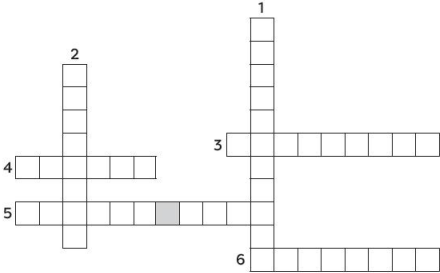Tiếng Anh 11 Review 1 LanguagePronunciation: Listen and complete the conversation. Then underline the weak forms of the auxiliary verbs, circle the contracted forms, and mark the consonant-to-vowel linking with ( - ). Practise saying the conversation in pairs. Vocabulary: 1. Choose the correct answers A, B, C, or D to complete the following sentences. 2. Solve the crossword. Use words and phrase you have learnt in Units 1, 2, and 3. The first letters are given to help you. Tổng hợp đề thi học kì 2 lớp 11 tất cả các môn - Kết nối tri thức Toán - Văn - Anh - Lí - Hóa - Sinh
Lựa chọn câu để xem lời giải nhanh hơn
Pronunciation Video hướng dẫn giải Listen and complete the conversation. Then underline the weak forms of the auxiliary verbs, circle the contracted forms, and mark the consonant-to-vowel linking with (‿). Practise saying the conversation in pairs. (Nghe và hoàn thành đoạn hội thoại. Sau đó gạch dưới các dạng yếu của trợ động từ, khoanh tròn các dạng rút gọn, và đánh dấu liên kết phụ âm với nguyên âm bằng (‿). Luyện nói đoạn hội thoại theo cặp.) A: What's it like living (1) _________ skyscraper? B: (2) __________ great. I (3) __________ enjoy the best views (4) ___________ the city from my sofa. A: (5) __________ have a balcony? B: No, (6) ___________. (7) ___________ huge windows. Example:
Phương pháp giải: Bài nghe: A: What's it like living in a skyscraper? (Cảm giác sống trong một toà nhà chọc trời thế nào?) B: It's great. I can enjoy best views of the city from my sofa. (Tuyệt lắm. Tôi có thể thưởng thức khung cảnh cả thành phố từ sofa.) A: Do you have a balcony? (Bạn có ban công chứ?) B: No I don't. But I have huge windows. (Tôi không có. Nhưng tôi có những cửa sổ lớn.) Lời giải chi tiết:
Vocabulary 1 Video hướng dẫn giải 1. Choose the correct answers A, B, C, or D to complete the following sentences. (Chọn đáp án đúng A, B, C hoặc D để hoàn thành các câu sau.) 1. If you want to stay healthy, you should have a balanced diet and _________ regularly. A. work out B. take out C. speak out D. stand out 2. For a healthy diet, you should ____________ sugar and eat more vegetables. A. take on B. cut down on C. go on D. cut with 3. Many experts believe that good ___________ transport will solve traffic problems in big cities. A. individual B. private C. public D. national 4. People feel safe in this neighbourhood because ____________ are installed everywhere. A. smart cities B. smartphones C. smart cars D. smart sensors 5. People of different generations often come into ____________ with one another. A. belief B. conflict C. agreement D. support 6. My brother is a true ___________. He grew up with technology, and started using a computer at an early age. A. curious boy B. critical thinker C. digital native D. book lover Lời giải chi tiết:
1. A If you want to stay healthy, you should have a balanced diet and work out regularly. (Nếu bạn muốn giữ gìn sức khỏe, bạn nên có một chế độ ăn uống cân bằng và tập thể dục thường xuyên.) A. work out (phr.v): luyện tập B. take out (phr.v): lấy ra C. speak out (phr.v): nói to D. stand out (phr.v): khác biệt 2. B For a healthy diet, you should cut down on sugar and eat more vegetables. (Để có một chế độ ăn uống lành mạnh, bạn nên cắt giảm lượng đường và ăn nhiều rau hơn.) A. take on (phr.v): tuyển dụng B. cut down on (phr.v): cắt giảm C. go on (phr.v): tiếp tục D. cut with (v.p): cắt với 3. C Many experts believe that good public transport will solve traffic problems in big cities. (Nhiều chuyên gia cho rằng giao thông công cộng tốt sẽ giải quyết vấn đề giao thông ở các thành phố lớn.) A. individual (adj): cá nhân B. private (adj) riêng tư C. public (adj): công cộng D. national (adj): thuộc về quốc gia 4. D People feel safe in this neighbourhood because smart sensors are installed everywhere. (Mọi người cảm thấy an toàn trong khu phố này vì các cảm biến thông minh được lắp đặt khắp mọi nơi.) A. smart cities: thành phố thông minh B. smartphones: điện thoại thông minh C. smart cars: ô tô thông minh D. smart sensors: cảm biến thông minh 5. B People of different generations often come into conflict with one another. (Những người thuộc các thế hệ khác nhau thường xung đột với nhau.) A. belief (n): niềm tin B. conflict (n): xung đột, mâu thuẫn C. agreement (n): sự đồng tình D. support (n): ủng hộ 6. C My brother is a true digital native. He grew up with technology, and started using a computer at an early age. (Anh trai tôi là người bản địa kỹ thuật số thực sự. Anh ấy lớn lên với công nghệ và bắt đầu sử dụng máy tính từ khi còn nhỏ.) A. curious boy: cậu bé tò mò B. critical thinker: người có tư duy phản biện C. digital native: người được sinh ra trong thời đại công nghệ D. book lover: người yêu sách Vocabulary 2 Video hướng dẫn giải 2. Solve the crossword. Use words and phrase you have learnt in Units 1, 2, and 3. The first letters are given to help you. (Giải ô chữ. Sử dụng các từ và cụm từ bạn đã học trong Bài 1, 2 và 3. Các chữ cái đầu tiên được đưa ra để giúp bạn.)
DOWN 1. Hong Kong aims to replace the old high-rise buildings with sustainable s___________ . 2. The high cost of living is a problem for many city d___________ . ACROSS 3. Thanks to the new t___________ , his health has improved quickly. 4. It is important to pass cultural v____________ from one generation to the next. 5. Many parents limit their children’s s________ t_______ to less than two hours per day. 6. If you want to build up your muscles s____________ , you need to lift weights. Lời giải chi tiết:
DOWN (Hàng dọc) 1. skyscrapers (n): nhà chọc trời Hong Kong aims to replace the old high-rise buildings with sustainable skyscrapers. (Hồng Kông đặt mục tiêu thay thế các tòa nhà cao tầng cũ kỹ bằng các tòa nhà chọc trời bền vững.) 2. dwellers (n): cư dân The high cost of living is a problem for many city dwellers. (Chi phí sinh hoạt cao là một vấn đề đối với nhiều cư dân thành phố.) ACROSS (Hàng ngang) 3. treatment (n): sự chữa trị Thanks to the new treatment, his health has improved quickly. (Nhờ phương pháp điều trị mới, sức khỏe của anh ấy đã cải thiện nhanh chóng.) 4. values (n): giá trị It is important to pass cultural values from one generation to the next. (Điều quan trọng là truyền các giá trị văn hóa từ thế hệ này sang thế hệ khác.) 5. screen time (np): thời gian dụng thiết bị Many parents limit their children’s screen time to less than two hours per day. (Nhiều bậc cha mẹ giới hạn thời gian sử dụng thiết bị của con cái họ dưới hai giờ mỗi ngày.) 6. strength (n): sức mạnh If you want to build up your muscle strength, you need to lift weights. (Nếu bạn muốn tăng cường sức mạnh cơ bắp, bạn cần nâng tạ.) Grammar 1 Video hướng dẫn giải 1. Complete the sentences with the correct forms of the verbs in brackets. (Hoàn thành các câu với dạng đúng của động từ trong ngoặc.) 1. My mother (take up) _____________ aerobics ten years ago. 2. The government (just, decide) _______________ to increase taxes on fast food. 3. I (win) ______________ several races since I started a new workout routine. 4. The idea of smart cities (start) _____________ in the 21st century. 5. So far, more than 70 million people (receive) _____________ vaccines to build protection against the virus. 6. I (already, show) ______________ my grandmother how fo use her new smartphone. Phương pháp giải:
Lời giải chi tiết:
1. My mother took up aerobics ten years ago. (Mẹ tôi tập thể dục nhịp điệu mười năm trước.) => Có "ten years ago" dùng thì quá khứ đơn => take - took 2. The government has just decided to increase taxes on fast food. (Chính phủ vừa quyết định tăng thuế đối với thức ăn nhanh.) => Có "just" dùng thì hiện tại hoàn thành: S + have/ has just + Ved/V3 3. I have won several races since I started a new workout routine. (Tôi đã thắng một số cuộc đua kể từ khi bắt đầu một thói quen tập luyện mới.) => Cấu trúc với "since": S1 + have/has Ved/V2 + SINCE + S2 + Ved/V2 4. The idea of smart cities started in the 21st century. (Ý tưởng về thành phố thông minh bắt đầu từ thế kỷ 21.) => Có "in the 21st century" (thế kỉ 21) dùng thì quá khứ đơn. 5. So far, more than 70 million people have received vaccines to build protection against the virus. (Cho đến nay, hơn 70 triệu người đã được tiêm vắc-xin để bảo vệ khỏi vi-rút.) => Có "so far" dùng thì hiện tại hoàn thành. 6. I have already shown my grandmother how fo use her new smartphone. (Tôi đã chỉ cho bà tôi cách sử dụng điện thoại thông minh mới của bà.) => Có "already" dùng thì hiện tại hoàn thành: S + have/has + ALREADY + Ved/V3 Grammar 2 Video hướng dẫn giải 2. Choose the correct words or phrases. (Chọn từ hoặc cụm từ đúng.) 1. You look so angry / angrily. What's wrong? 2. I think / I'm thinking of taking up yoga. I feel a bit stressed / stress these days. 3. Do you remember / Are you remembering Ms Wilson? She’s a great yoga instructor. 4. The traffic gets / is getting worse. What do you think / are you thinking we should do? Lời giải chi tiết:
1. You look so angry. What's wrong? (Trông bạn rất tức giận. Có chuyện gì vậy?) => Sau động từ tình thái "look" cần tính từ. angry (adj) - angrily (adv) 2. I'm thinking of taking up yoga. I feel a bit stressed these days. (Tôi đang nghĩ đến việc tập yoga. Dạo này tôi cảm thấy hơi căng thẳng.) => Dùng thì hiện tại tiếp diễn để diễn tả hành động đang xảy ra tại thời điểm nói: I'm thinking; sau động từ tính thái "feel" cần tính từ. stress (n) - stressed (adj) 3. Do you remember Ms Wilson? She's a great yoga instructor. (Bạn có nhớ cô Wilson không? Cô ấy là một huấn luyện viên yoga tuyệt vời.) => Dùng thì hiện tại đơn để diễn tả một hành động ở hiện tại. 4. The traffic is getting worse. What do you think we should do? (Giao thông ngày càng tệ. Bạn nghĩ chúng ta nên làm gì?) => Dùng thì hiện tại tiếp diễn để diễn tả sự biển đổi: is getting; để nói về suy nghĩ dùng thì hiện tại đơn của động từ tình thái "think". Grammar 3 Video hướng dẫn giải 3. Choose the correct answers A, B, C, or D to complete the following sentences. (Chọn đáp án đúng A, B, C hoặc D để hoàn thành các câu sau.) 1. If you want to maintain a healthy weight, you _________ have snacks between meals. A. shouldn't B. should C. must D. don't have to 2. I __________ strictly follow the doctor’s instructions if I want to get better quickly. A. shouldn't B. must C. can D. don't have to 3. The government ___________ improve the infrastructure of big cities to boost the economy. A. mustn't B. doesn't have to C. should D. didn't have to 4. People living in high-rise buildings ___________ obey the safety rules and regulations strictly. A. shouldn't B. mustn't C. may D. have to 5. Lots of women in the past ___________ stay at home, look after their children, and do all housework. A. must B. should C. had to D. have to 6. My parents respect my career choice, so I __________ follow in their footsteps. A. mustn’t B. don‘t have to C. should D. shouldn't Lời giải chi tiết:
1. A If you want to maintain a healthy weight, you shouldn't have snacks between meals. (Nếu bạn muốn duy trì cân nặng khỏe mạnh, bạn không nên ăn vặt giữa các bữa ăn.) A. shouldn't + V: không nên B. should + V: nên C. must + V: phải D. don't have to + V: không cần 2. B I must strictly follow the doctor’s instructions if I want to get better quickly. (Tôi phải tuân thủ nghiêm ngặt các hướng dẫn của bác sĩ nếu tôi muốn khỏi bệnh nhanh chóng.) A. shouldn't + V: không nên B. must + V: phải C. can + V: có thể D. don't have to + V: không cần 3. C The government should improve the infrastructure of big cities to boost the economy. (Chính phủ nên cải thiện cơ sở hạ tầng của các thành phố lớn để thúc đẩy nền kinh tế.) A. mustn't + V: không được B. doesn't have to + V: không cần C. should + V: nên D. didn't have to + V: đã không cần 4. D People living in high-rise buildings have to obey the safety rules and regulations strictly. (Những người sống trong các tòa nhà cao tầng phải tuân thủ nghiêm ngặt các quy tắc và quy định về an toàn.) A. shouldn't + V: không nên B. mustn't + V: không được C. may + V: có thể D. have to + V: phải 5. C Lots of women in the past had to stay at home, look after their children, and do all housework. (Rất nhiều phụ nữ trong quá khứ phải ở nhà, chăm sóc con cái và làm tất cả việc nhà.) A. must + V: phải B. should + V: nên C. had to + V: phải (trong quá khứ) D. have to + V: phải (ở hiện tại) 6. B My parents respect my career choice, so I don’t have to follow in their footsteps. (Cha mẹ tôi tôn trọng sự lựa chọn nghề nghiệp của tôi, vì vậy tôi không cần phải nối bước họ.) A. mustn’t + V: không được B. don't have to + V: không cần C. should + V: nên D. shouldn't + V: không nên
>> 2K9 Học trực tuyến - Định hướng luyện thi TN THPT, ĐGNL, ĐGTD ngay từ lớp 11 (Xem ngay) cùng thầy cô giáo giỏi trên Tuyensinh247.com. Bứt phá điểm 9,10 chỉ sau 3 tháng, tiếp cận sớm các kì thi.
|
























